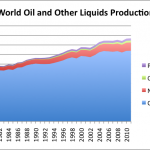IEA
The EIA, unlike the IEA, has been strident in its dismissal of peak oil. But the data that the EIA publishes tells a very different story than the one it wants us to hear. Gail the Actuary has a really good analysis up at the Oil Drum.. The essential message - that crude oil production remains basically flat, as it has since 2005, and that growth in non-crude "liquids" (all those things that have made up for the lack of crude growth in world demand) aren't growing as fast as desired or predicted.
Among the critical takeways - that unconventional oil production probably will cease to keep…
I hope my readers will forgive me today for lapsing back into my prior profession rather than my present one as an energy and environmental writer. You see, before I gained fame and fortune writing about our ecological situation, I was a mild-mannered college teacher, whose favorite and most important job was teaching rhetoric to undergraduates.
I am perhaps odd in observing that I thought that teaching writing was the most important thing I did. Most academics believe their primary subject matter is the central portion of their work, but I came to see that the place that I had the greatest…
The IEA is the bestest agency in the world at admitting peak oil without actually admitting peak oil. They've now achieved a record - three years in a row of precisely matching the language and predictions of the peak oil community without actually saying the words. Matthew Wild points out the incredible overlap:
According to the IEA's latest Oil Market Report, published August 11, global demand will reach 86.6 million barrels per day in 2010, and then 87.9 million barrels per day in 2011, assuming a continuing global economic recovery. This means demand is set to pass the all-time high of…
The IEA has pretty much conceeded peak oil, announcing that growth to meet demand in the coming decades will come from entirely mythical sources. Ok, they didn't say that, what they said in the latest World Energy Outlook was that the majority of oil production by 2030 will be coming from "fields yet to be developed or found." But what that means is "we're hoping someone with magic powers will come and reverse the long-stand trend towards decline in oil discovery." Because we know that oil discovery peaked in 1964 and has been declining ever since, so that we are consuming oil five times…
